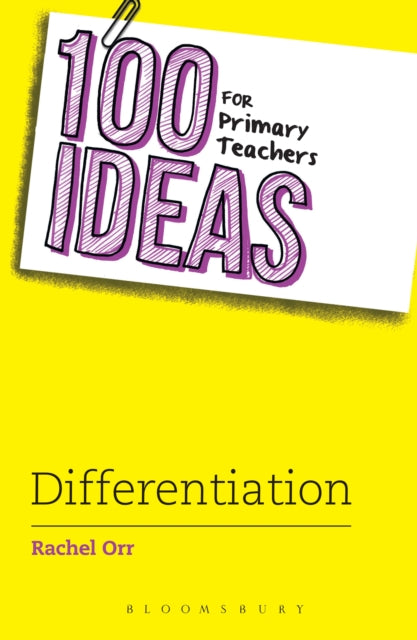
100 Ideas for Primary Teachers: Differentiation
Cover -- Title -- Imprint -- Contents -- Acknowledgements -- Introduction -- How to use this book -- Part 1 To group or not togroup? -- 1 Inclusively whole -- 2 Jigsaw -- 3 Mixed bag -- 4 You've got a friend in me -- 5 Think, pair, share -- 6 Like for like -- 7 Buzz groups -- 8 Carousel -- 9 Pass it on -- 10 Team challenge -- Part 2 Let it go! Discover and explore -- 11 Envoys and KUDos -- 12 Bubble -- 13 In your own time -- 14 Let's discover! -- 15 Snowballing -- 16 DIY -- 17 Help envelopes -- 18 Top Trumps -- 19 Spies -- 20 What money will buy -- Part 3 Que sera sera:Differentiation by outcome -- 21 Beach ball -- 22 Dice - let 'em roll! -- 23 RAG balls in a bag -- 24 Brain ticklers -- 25 Reading list -- 26 Visualisation -- 27 Help on the back -- 28 Open activities -- 29 Stepped up -- 30 Options -- Part 4 Self-help centre: Differentiated support that children access independently -- 31 Phone a friend -- 32 C3B4Me -- 33 Challenge cards -- 34 The five Bs -- 35 Challenge tables -- 36 Key word display -- 37 Dictionary corner -- 38 WAGOLL -- 39 Check sheets -- 40 Scrap paper -- Part 5 Let's ask! Questioning skills -- 41 Questioning -- 42 BOG3F -- 43 Odd one out -- 44 Bronze, silver and goldquestions -- 45 Hot-seating -- 46 Conscience alley -- 47 Solve a mystery -- 48 Expert corner -- 49 Choices -- 50 Wonderwall -- Part 6 Building challenges and structures:Scaffolding and writing frames -- 51 All eyes, ears, nose, mouthand hands -- 52 Scaffolding - writing frame -- 53 SODA -- 54 Modelling talk-write -- 55 Boxing it up -- 56 Must, should, could -- 57 RUCSAC (problem-solvingscaffolds) -- 58 Getting paragraphs early -- 59 Story mapping -- 60 Physical writing frames -- Part 7 Upwards plenaries:How to use the end of the lesson to find out what pupils know, across a range of abilities -- 61 Write and wipe -- 62 Three things -- 63 Mind mapping




